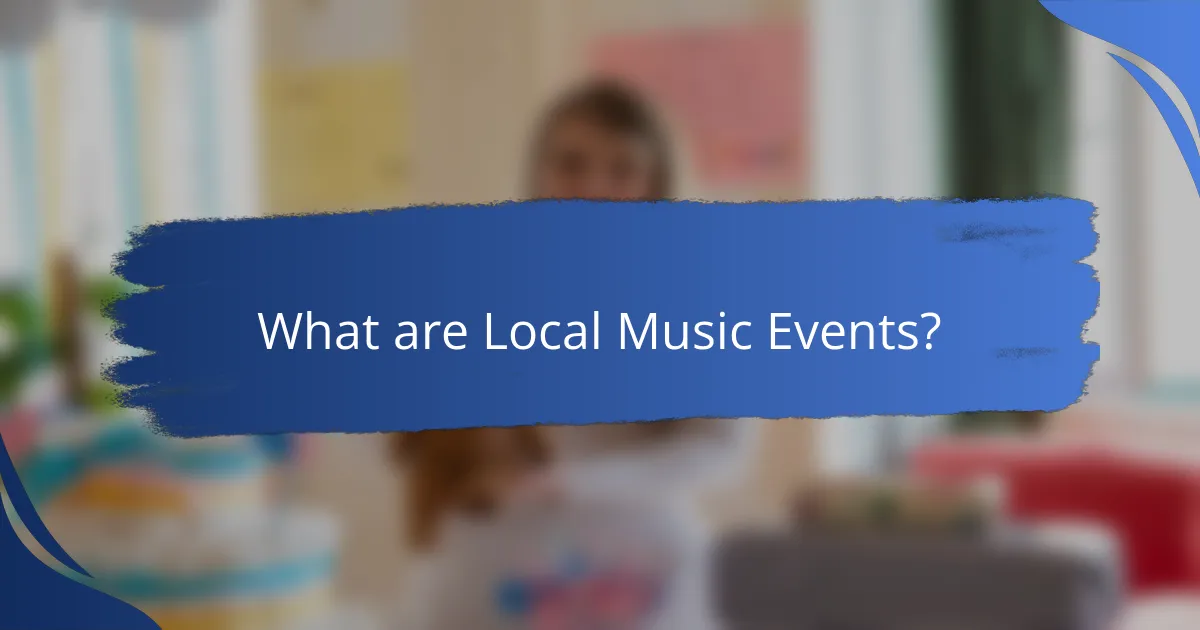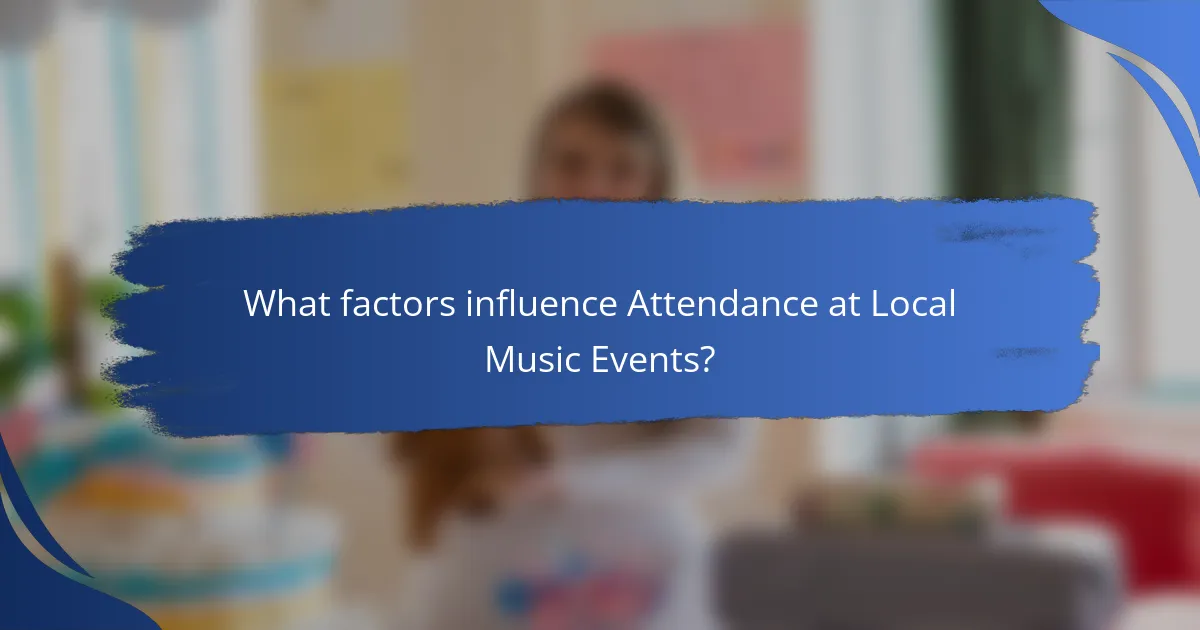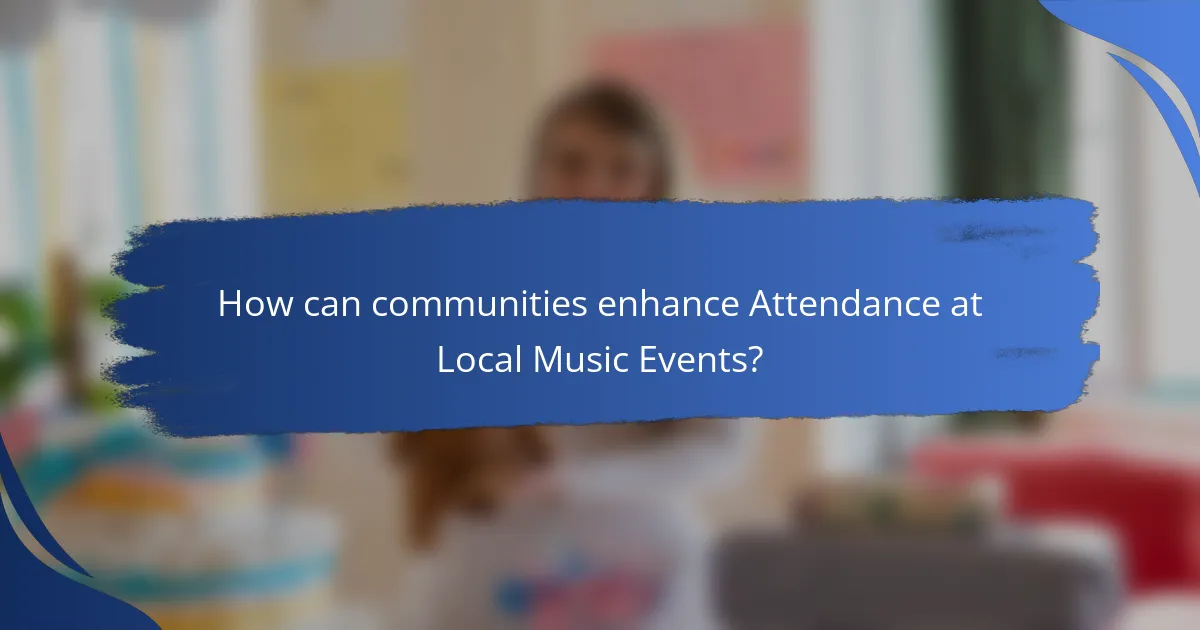Local music events are gatherings where musicians perform in various venues, such as parks and community centers, showcasing local artists and cultural genres. These events play a vital role in fostering community engagement, supporting local talent, and enhancing cultural vibrancy, as highlighted by studies from the National Endowment for the Arts. Key factors influencing attendance include performer quality, music genre, marketing efforts, venue location, and community support. Collaborations with local organizations, effective social media promotion, and family-friendly environments can significantly boost participation rates. Feedback from attendees is also essential for tailoring future events to meet community preferences.

What are Local Music Events?
Local music events are gatherings where musicians perform for an audience in a specific location. These events can take place in various venues, such as parks, bars, or community centers. They often feature local artists and genres representative of the community’s culture. Attendance at these events fosters community engagement and supports local talent. According to a study by the National Endowment for the Arts, local music events contribute to cultural vibrancy and social cohesion. These events also provide opportunities for networking among artists and attendees.
How do Local Music Events contribute to Community Engagement?
Local music events enhance community engagement by fostering social interaction and cultural exchange. They provide a platform for local artists to showcase their talent. This encourages residents to connect with one another through shared musical experiences. According to a study by the National Endowment for the Arts, community events increase local participation by 25%. These gatherings also promote local businesses, as attendees often frequent nearby shops and restaurants. Furthermore, music events can raise awareness for community issues, uniting people around common causes. Overall, local music events create a sense of belonging and strengthen community bonds.
What types of Local Music Events are commonly held in communities?
Local music events commonly held in communities include concerts, festivals, open mic nights, and community jam sessions. Concerts feature local bands or artists performing at venues. Festivals celebrate music genres, often with multiple acts and activities. Open mic nights allow local musicians to showcase their talent in informal settings. Community jam sessions encourage collaboration among musicians and foster a sense of belonging. These events enhance community engagement and cultural significance by promoting local talent and bringing people together.
How do different demographics participate in Local Music Events?
Different demographics participate in local music events in varying ways. Younger audiences, particularly those aged 18-34, often attend music festivals and live performances. They engage through social media promotion and online ticket purchases. Middle-aged attendees, typically aged 35-54, prefer local concerts and community events. This group often values the social aspect and supports local artists. Older adults, aged 55 and above, may attend events that feature familiar genres or artists. They often participate through community centers or local clubs. According to a 2022 Nielsen report, 70% of attendees at local music events are under 45 years old. This highlights the strong presence of younger demographics at these events. Additionally, ethnic diversity plays a role in participation, with different cultural backgrounds favoring specific genres and events. Overall, participation is influenced by age, social connections, and cultural preferences.
Why are Local Music Events culturally significant?
Local music events are culturally significant because they foster community identity and social cohesion. These events provide a platform for local artists to showcase their talent. They also encourage participation from diverse demographic groups. This participation strengthens communal ties and promotes cultural exchange. Studies show that communities with active music scenes experience higher levels of civic engagement. Local music events often highlight regional traditions and histories, preserving cultural heritage. Furthermore, they stimulate local economies by attracting visitors and supporting local businesses.
How do Local Music Events reflect local culture and identity?
Local music events serve as a mirror of local culture and identity. They showcase the unique traditions, values, and artistic expressions of a community. For example, genres like bluegrass in Appalachia or reggae in Jamaica highlight regional histories and social issues. These events often feature local artists who draw inspiration from their surroundings. Attendees connect through shared experiences and cultural narratives presented in the music. Research shows that participation in local music events fosters a sense of belonging and community pride. According to a study by the National Endowment for the Arts, 61% of attendees feel more connected to their local culture after participating in such events. This illustrates how local music events are essential in reinforcing cultural identity.
What role do Local Music Events play in preserving cultural heritage?
Local music events play a crucial role in preserving cultural heritage. They provide a platform for traditional music and local artists. These events foster community engagement and participation. Attendees experience and appreciate their cultural roots through music. Additionally, local music events often feature traditional instruments and styles. This exposure helps to keep these cultural practices alive. Studies show that such events strengthen community identity and pride. They also encourage intergenerational knowledge transfer within communities.

What factors influence Attendance at Local Music Events?
Attendance at local music events is influenced by several key factors. These factors include the quality of the performers, the genre of music, and the event’s marketing efforts. Additionally, the location and accessibility of the venue play a significant role. Weather conditions can also impact attendance, especially for outdoor events. Community engagement and local support are crucial as well. Studies show that events promoted through social media tend to attract larger crowds. Local music events that foster a sense of community often see higher participation rates.
How do marketing strategies affect Attendance at Local Music Events?
Marketing strategies significantly influence attendance at local music events. Effective marketing creates awareness and interest among potential attendees. Strategies such as social media promotion, targeted advertising, and community engagement enhance visibility. Research indicates that events with robust marketing campaigns see higher attendance rates. For example, a study by the National Endowment for the Arts found that targeted outreach can increase participation by up to 30%. Additionally, partnerships with local businesses can amplify marketing efforts. These collaborations often result in cross-promotion, further attracting audiences. Overall, well-executed marketing strategies are crucial for maximizing attendance at local music events.
What are effective promotional tactics for Local Music Events?
Effective promotional tactics for local music events include social media marketing, community partnerships, and targeted advertising. Social media platforms such as Facebook and Instagram can reach local audiences quickly. Creating event pages and sharing engaging content increases visibility. Community partnerships with local businesses can foster mutual promotion. Collaborating with local influencers can also enhance reach. Targeted advertising through local online platforms can attract specific demographics. Email marketing to previous attendees can encourage repeat attendance. Utilizing local radio stations for event announcements can further spread the word. These tactics are proven to increase attendance and community involvement in local music events.
How does social media impact the visibility of Local Music Events?
Social media significantly enhances the visibility of local music events. It allows event organizers to reach a broader audience quickly. Platforms like Facebook and Instagram enable targeted advertising to specific demographics. This targeted approach increases the likelihood of attracting attendees who are interested in the genre.
Moreover, social media facilitates real-time updates and engagement with potential attendees. Users can share events within their networks, amplifying reach through organic sharing. According to a study by Eventbrite, 95% of event creators use social media for promotion. This statistic underscores the reliance on these platforms for visibility.
Additionally, social media fosters community engagement by allowing users to interact with artists and organizers. This interaction builds excitement and anticipation for the events. Overall, the impact of social media on local music events is substantial, driving attendance and community involvement.
What are the barriers to attending Local Music Events?
Barriers to attending local music events include financial constraints, lack of transportation, and scheduling conflicts. Many individuals cite ticket prices as a significant deterrent. Transportation issues can arise from limited public transit options or the inability to find parking. Additionally, busy schedules often conflict with event timings, preventing attendance. Other barriers may include safety concerns and accessibility issues for individuals with disabilities. Community engagement can be hindered when these barriers are prevalent, affecting overall participation in local music culture.
How do economic factors influence Attendance at Local Music Events?
Economic factors significantly influence attendance at local music events. Disposable income affects individuals’ ability to purchase tickets. Higher disposable income generally leads to increased attendance. Conversely, economic downturns reduce disposable income and attendance rates. Ticket prices also play a crucial role; affordable events attract larger crowds. Additionally, local economic conditions impact sponsorship and funding for events. Research indicates that areas with stronger economies see higher participation in cultural activities. A study by the National Endowment for the Arts shows that economic stability correlates with increased attendance at local arts events.
What logistical challenges do attendees face when going to Local Music Events?
Attendees face several logistical challenges when going to local music events. Transportation issues are common, including limited parking and public transit options. Many venues are located in areas with heavy traffic, complicating access. Additionally, ticket availability can be a challenge, especially for popular events that sell out quickly. Attendees may also encounter long lines at entry points, causing delays. Weather conditions can affect attendance and comfort, particularly for outdoor events. Accessibility for individuals with disabilities may not always be adequate at venues. Lastly, safety concerns, such as overcrowding or inadequate security, can deter attendance. These challenges can significantly impact the overall experience of attendees at local music events.

How can communities enhance Attendance at Local Music Events?
Communities can enhance attendance at local music events by fostering strong local partnerships. Collaborating with schools, businesses, and local artists can create a more vibrant music scene. Promoting events through social media increases visibility and engagement. Offering incentives such as discounts or free entry for students can attract younger audiences. Creating family-friendly environments encourages attendance from diverse demographics. Scheduling events during peak times maximizes potential attendance. Furthermore, gathering feedback from attendees can help tailor future events to community preferences. According to a study by the National Endowment for the Arts, community engagement significantly boosts participation in local cultural events.
What initiatives can be implemented to boost community participation?
Organizing local music events is an effective initiative to boost community participation. These events can create a sense of belonging among residents. Community workshops can also be implemented to engage residents in planning these events. Educational programs about music and cultural heritage can increase interest and involvement. Social media campaigns can promote events and encourage attendance. Collaborations with local schools can foster youth participation. Incentives like discounts or free entry can attract more attendees. Surveys can gather feedback to improve future events and enhance community involvement.
How can partnerships with local businesses support Local Music Events?
Partnerships with local businesses can significantly support local music events by providing financial sponsorship. This funding can cover costs such as venue rental, equipment, and marketing. Local businesses can also offer in-kind contributions, such as food, beverages, or promotional materials, enhancing the event experience. Collaborations can increase visibility for both the music events and the businesses involved. For example, joint marketing efforts can attract larger audiences, benefiting local economies. Additionally, businesses can leverage their customer base to promote events, driving attendance. This symbiotic relationship fosters community engagement and strengthens local culture.
What role do volunteers play in facilitating Local Music Events?
Volunteers play a crucial role in facilitating local music events. They assist with event organization and logistics. Volunteers help set up stages and sound equipment. They manage ticket sales and entry points. Volunteers also provide support during performances. They assist with crowd management and safety. Their efforts enhance the overall experience for attendees. According to a study by the National Endowment for the Arts, community engagement increases when volunteers are involved in local events.
What best practices can improve the experience at Local Music Events?
Engaging local communities is essential to improve experiences at local music events. Organizing events in accessible locations increases attendance and participation. Providing diverse music genres caters to varied audience preferences. Incorporating local artists fosters community pride and connection. Implementing clear communication about event details enhances attendee expectations. Offering food and beverage options adds to the overall enjoyment. Creating a welcoming atmosphere encourages social interaction among attendees. Utilizing feedback from previous events guides future improvements. These practices have been shown to enhance satisfaction and attendance at local music events.
How can organizers create an inclusive environment at Local Music Events?
Organizers can create an inclusive environment at local music events by implementing accessible venues and diverse programming. Accessibility includes ensuring wheelchair ramps, accessible restrooms, and clear signage. Diverse programming involves featuring artists from various backgrounds and genres. This approach encourages participation from underrepresented communities.
Research shows that inclusive events attract wider audiences. A study by the National Endowment for the Arts highlights that diversity in programming increases attendance and community engagement. Organizers should also promote a zero-tolerance policy for discrimination. This fosters a safe space for all attendees.
Additionally, providing resources such as sign language interpreters enhances accessibility. Engaging with local community groups can help identify specific needs. Feedback from attendees can guide future improvements. Overall, these strategies contribute to a welcoming and inclusive atmosphere at local music events.
What are some tips for attendees to maximize their experience at Local Music Events?
To maximize their experience at local music events, attendees should arrive early to secure good viewing spots. This allows them to enjoy the atmosphere and engage with the community. Attendees should also familiarize themselves with the lineup and schedule. Knowing the artists performing helps in planning which performances to prioritize. Engaging with other attendees enhances the experience, fostering a sense of community. Bringing essentials like water and portable seating can improve comfort during the event. Additionally, supporting local vendors contributes to the event’s success and community economy. Lastly, sharing experiences on social media can promote local music culture.
Local music events are gatherings where musicians perform for audiences in various venues, fostering community engagement and supporting local talent. The article explores how these events enhance social interaction, promote cultural identity, and provide platforms for diverse demographics to participate. Key factors influencing attendance include marketing strategies, economic conditions, and logistical challenges, while effective promotional tactics and partnerships with local businesses can boost participation. Additionally, the article highlights the cultural significance of local music events in preserving heritage and creating a sense of belonging within communities.